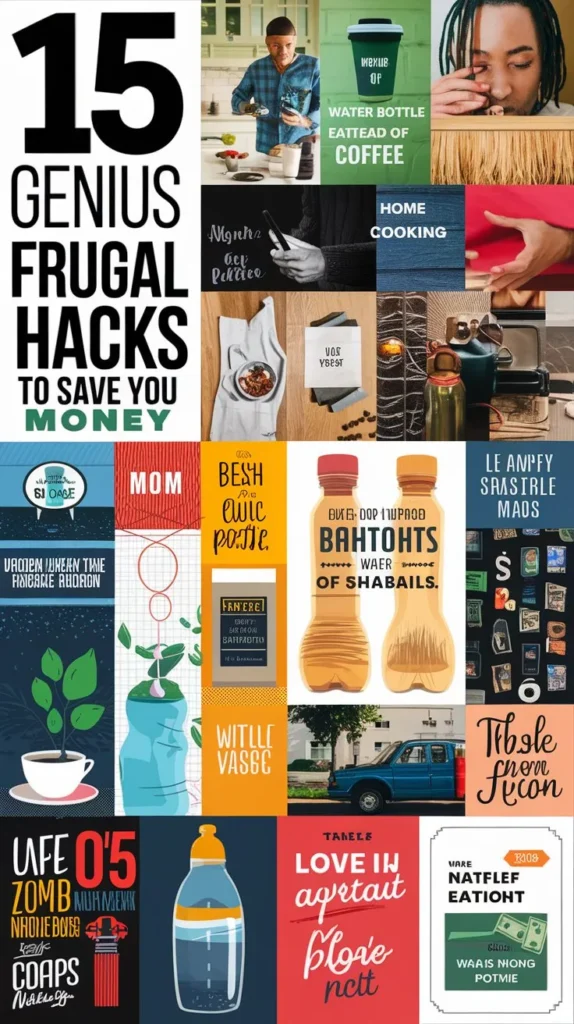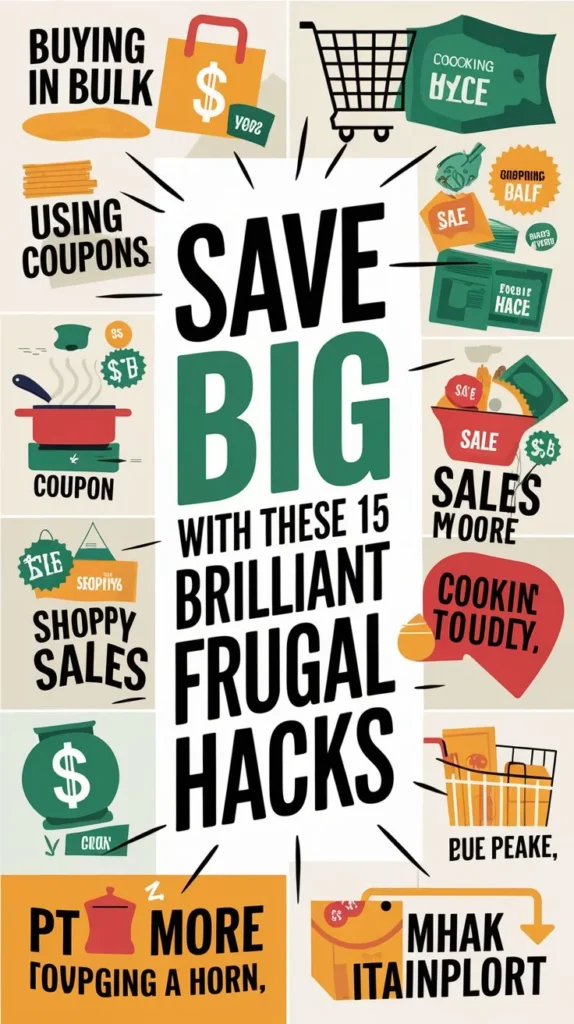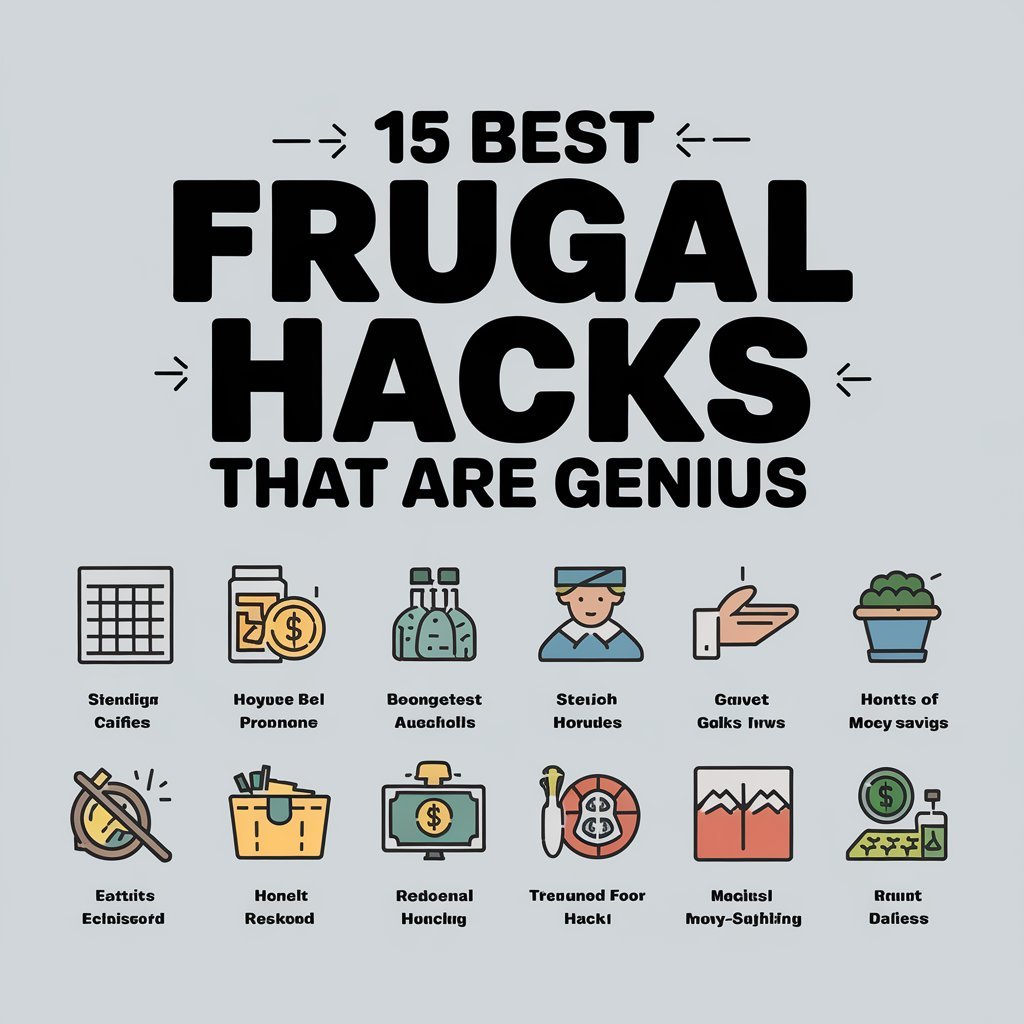You’re likely no stranger to the importance of managing your finances effectively, but with the ever-rising cost of living, it’s becoming increasingly challenging to make ends meet. That’s where clever frugal hacks come in – simple yet effective strategies that can substantially reduce your expenses without compromising your quality of life.
From optimizing your household expenses to making the most of free entertainment options, there are numerous ways to cut costs without feeling the pinch. But what are the most effective frugal hacks for 2024, and how can you start implementing them in your daily life?
In A Nutshell
- Conduct utility audits to identify energy consumption areas for reduction and install energy-efficient light bulbs.
- Plan meals in advance to avoid buying too much food, and use up leftovers creatively to reduce waste.
- Create natural cleaning products using baking soda, vinegar, and lemon juice to save money and reduce harsh chemicals.
- Review auto-renewing services regularly and cancel unused services to avoid unnecessary expenses.
- Implement a rag system using old cloth items to reduce paper towel usage in the kitchen.
Save on Household Expenses

How can you trim down your household expenses without sacrificing comfort?
Start by conducting utility audits to identify areas where you can cut back. Check your energy consumption, water usage, and gas bills to see where you can make adjustments.
Consider installing energy-efficient light bulbs, turning off lights when not in use, and adjusting your thermostat to lower your energy bills.
Bill tracking is also essential in saving on household expenses.
Keep track of your monthly bills, including rent/mortgage, utilities, and internet. You can use a spreadsheet or a budgeting app to make it easier.
By monitoring your bills, you can identify areas where you can cut back and make adjustments accordingly. You can also negotiate with service providers to get a better deal.
For instance, you can ask your internet provider if they’ve any promotions or discounts available.
Reduce Food Waste Strategies
One of the most effective ways to reduce household expenses is by implementing strategies to minimize food waste.
You can start by keeping a food diary to track what you buy, store, and consume. This will help you identify patterns and areas where you can improve.
Meal prep is another great way to reduce food waste.
By planning your meals in advance, you can avoid buying too much food that may go to waste.
Here are some additional strategies to help you minimize food waste:
- Plan your meals: Take some time each week to plan out your meals for the next few days. This will help you avoid buying too much food and reduce the risk of waste.
- Shop your fridge first: Before you go grocery shopping, take stock of what you already have at home. This will help you avoid buying duplicate items and reduce waste.
- Use up leftovers: Be creative with your leftovers and try to use them up in new meals. This will help reduce waste and save you money.
- Freeze it: If you have food that’s approaching its expiration date, consider freezing it for later use. This will help extend its shelf life and reduce waste.
DIY Cleaning Products
In your quest for a more frugal lifestyle, making the switch to DIY cleaning products can be a game-changer.
By creating your own cleaning solutions, you can save money on commercial products and reduce your exposure to harsh chemicals.
To get started, you can make natural scrubs using simple ingredients like baking soda, vinegar, and lemon juice.
For example, mix equal parts baking soda and water to create a paste that’s perfect for cleaning countertops and sinks.
You can also use baking soda and vinegar to create a natural drain cleaner.
Simply pour 1/2 cup of baking soda down the drain, followed by 1 cup of vinegar.
Let the mixture sit for a few hours, then rinse with hot water.
In addition to natural scrubs, you can also make homemade disinfectants using tea tree oil and other essential oils.
Mix 1 tablespoon of tea tree oil with 1 cup of water in a spray bottle, and use it to disinfect surfaces like doorknobs and light switches.
With a little creativity and some simple ingredients, you can create effective and eco-friendly cleaning products that fit your budget and values.
Cancel Subscription Services
Switching gears, reexamining the bills for all your services could reveal various options ripe for cancellations and perhaps allocations into wiser categories such as smart cooking projects like concocting nontoxic inhouse mixtures for cleaning purposes like mentioned before.
This simple step can save you a significant amount of money in the long run.
When reviewing your subscriptions, keep an eye out for the following:
- Unused services: Identify services you haven’t used in the past month, such as streaming platforms or gym memberships. Consider canceling them to avoid unnecessary expenses.
- Auto renewals: Be mindful of services that auto-renew, such as software subscriptions or magazine memberships. Review these regularly to confirm you still need them.
- Free Trials: Keep track of free trials you’ve signed up for, as they often convert to paid subscriptions automatically. Cancel them before the trial period ends to avoid unexpected charges.
- Duplicates: Check for duplicate services, such as multiple music streaming platforms. Consolidate your subscriptions to avoid paying for redundant services.
Shop Secondhand First
You’re likely no stranger to the convenience of buying new, but consider flipping that script: make secondhand shopping your go-to.
Not only will you save money, but you’ll also reduce waste and find unique items that reflect your personal style. Start by exploring local thrift stores, where you can score great deals on gently used items.
You might stumble upon vintage clothing, antique furniture, or even rare collectibles.
Thrift store finds can be hit-or-miss, but that’s part of the fun.
You’ll need to sift through racks of clothes and shelves of household items to find the hidden gems. When you do, you’ll feel a sense of accomplishment and pride in your frugal shopping skills.
Consider shopping during off-peak hours or on weekdays to avoid crowds and increase your chances of finding the best deals.
Vintage shopping is another great way to find one-of-a-kind items.
You can find vintage shops in your local area or browse online marketplaces. Keep an open mind and be patient – you never know what treasures you might discover.
Use Cashback Apps
Many cashback apps offer a percentage of your purchase back as a reward for shopping through their platform.
By using these apps, you can earn cashback rewards on your everyday purchases, which can add up over time.
- Sign up for multiple apps: Don’t limit yourself to just one cashback app. Sign up for multiple apps to maximize your cashback rewards.
- Use apps for online shopping: Use cashback apps for online shopping to earn rewards on your purchases.
- Track your refunds: Use refund tracking features to verify you receive your cashback rewards.
- Combine with other discounts: Combine cashback rewards with other discounts, such as coupons or promo codes, to save even more.
Lower Your Energy Bills
Cutting your energy bills doesn’t have to be a formidable task.
You can start by making a few simple changes to your daily habits and investing in some smart technology. Consider installing Smart Thermostats, which can learn your schedule and preferences to optimize your heating and cooling usage.
These devices can be controlled remotely, so you can adjust the temperature even when you’re not at home.
Another effective way to lower your energy bills is to conduct an Energy Audit.
This involves evaluating your home’s energy efficiency by checking for air leaks, inspecting insulation, and examining your windows and doors.
You can hire a professional to do this for you, or you can do it yourself with a DIY kit.
The audit will help you identify areas where energy is being wasted and provide recommendations for improvement.
Repurpose Old Items
By finding creative ways to reduce your energy consumption, you’re also setting the stage to tackle another key aspect of frugal living: making the most of what you already have.
Repurposing old items is a great way to breathe new life into old furniture and other household items. Not only will you be reducing waste, but you’ll also be saving money by not having to buy new things.
Here are a few ideas to get you started:
- Turn old pallets into shelves: If you have some old pallets lying around, consider turning them into shelves or a coffee table. With a little bit of creativity, you can create a unique and functional piece of furniture.
- Use old jars as vases: Old jars can be used as vases for fresh flowers or as a centerpiece for your dining table. Simply clean them out and add some decorative paint or glitter.
- Upcycle old furniture: Give old furniture a new life by repainting or restaining it. You can also add new hardware or upholstery to give it a fresh look.
- Create a headboard from an old door: If you have an old door that’s no longer in use, consider turning it into a headboard for your bed. This can add a unique touch to your bedroom and create a cozy atmosphere.
Plan Your Meals
Planning your meals in advance can be a game-changer for your wallet and your waistline.
By taking a few minutes each week to plan out your meals, you can save money on groceries, reduce food waste, and eat healthier.
Start by deciding on a few meals you want to make for the week, and then make a grocery list to match.
This will help you avoid buying unnecessary items and stick to your budget.
Meal prep is also a great way to save time and money.
Consider setting aside one day a week to prep meals for the next few days.
This can be as simple as cooking a big batch of rice or roasting a few vegetables.
Having healthy meals ready to go can help you avoid relying on takeout or fast food, which can be expensive and unhealthy.
Use Public Libraries
Your local public library is a treasure trove of free resources that can save you money and enrich your life. From best-selling books and movies to music, podcasts, and e-learning tools, the options are vast. The key to taking full advantage is understanding the available offerings.
Consider using these:
- E-books and Audiobooks: Get access to best-sellers in various formats. It reduces spending on entertainment without the cost.
- Online Resources and Learning: Build a skill by tapping into thousands of hours of webinars and podcasts across genres from economics and finances to physical exercise. Popular languages have different degrees for starters up through individuals developing increased agility at modern-level speakers.
Grow Your Own Food
Taking a break from enjoying your free audiobooks or brushing up on skills with the public library’s webinars, have you considered exploring a new world of cost-cutting measures – one where the only library required is Mother Nature herself?
Growing your own food can be an incredibly rewarding and cost-effective way to provide for your family.
You don’t need a large backyard to get started; consider using container gardens or vertical farming techniques to make the most of your space.
Start by selecting a few easy-to-grow plants like herbs, leafy greens, or tomatoes.
Look for varieties that are disease-resistant and suitable for your climate.
Use recycled containers or DIY planters to save money and reduce waste.
For vertical farming, use a trellis or a wall-mounted planter to train vining plants like peas or cucumbers to grow upwards.
As you harvest your homegrown produce, you’ll enjoy the satisfaction of knowing you’re saving money and eating fresh, healthy food.
Plus, you’ll be reducing your reliance on industrial agriculture and lowering your carbon footprint.
With a little creativity and elbow grease, you can turn even the smallest space into a thriving garden.
Avoid Impulse Buys
Impulse buys can quickly derail even the best-laid frugal plans.
You’ve likely been there – strolling through a store, seeing something you don’t need, and buying it anyway.
To avoid this, try these budgeting tricks:
1. Make a shopping list and stick to it: Before you head to the store, write down the items you need to purchase.
Sticking to your list will help you avoid browsing and reduce the likelihood of impulse buys.
2. Set a 30-day waiting period: When you see something you want to buy, wait 30 days before making the purchase.
This will help you determine if the item is something you truly need or just a want.
3. Use cash: Paying with cash can help you stick to your budget and make you more mindful of your spending.
4. Avoid shopping when emotional: Shopping can be an emotional experience, and buying things can give you a temporary high.
Avoid shopping when you’re feeling stressed, bored, or emotional, as this can lead to impulse buys.
Use Rags Instead Paper
Using rags instead of paper towels can be a simple yet effective way to reduce your household expenses and minimize waste.
You can start by collecting old t-shirts, towels, and other cloth items that are no longer usable. Cut them into smaller pieces and store them in a designated area, such as a rag basket or a bucket with a lid.
This rag organization system will help you keep your rags clean and within reach.
When it comes to cleaning, you can use these rags for dusting, wiping down surfaces, and cleaning up spills.
They can also be used as cloth alternatives for paper towels in the kitchen. For example, you can use a rag to dry dishes or wipe down countertops.
Buy in Bulk Wisely
Reducing household expenses often involves making small changes to your daily habits, like switching to rags instead of paper towels.
One of the most effective ways to cut costs is to buy in bulk wisely. If you’re strategic about what you purchase, bulk shopping can help you save a significant amount of money.
Before heading to the wholesale clubs, it’s crucial to have a clear understanding of your household’s needs.
To maximize the benefits of buying in bulk, keep these tips in mind:
When to Buy in Bulk Wisely
- Only buy non-perishable items: This will guarantee you don’t waste any money on items that will expire or go bad.
- Consider your storage space: Before buying in bulk, make sure you have enough space to store your items without cluttering your home.
- Look for the best prices: Compare prices among different stores to confirm you’re getting the best deal.
- Check expiration dates: Even with non-perishable items, check the expiration dates to avoid purchasing something that may become useless in a few months.
Use Free Entertainment
You can save a significant amount of money each year by making a few simple changes to your entertainment habits.
Start by taking advantage of free trials offered by streaming services. Many platforms provide a month’s worth of free access to their content, allowing you to enjoy your favorite shows and movies without committing to a paid subscription.
Another way to save money is to look for free entertainment options in your community. Check your local park or recreation center for outdoor games, concerts, or movie screenings.
These events are often free or low-cost and provide a great way to meet new people and have fun.
You can also host your own free entertainment nights at home. Invite friends over for game nights or potluck dinners, which can be just as enjoyable as going out to a restaurant or movie theater.
Additionally, consider borrowing books, audiobooks, or e-books from your local library instead of buying them.
Frequently Asked Questions
How Do I Stay Motivated to Maintain a Frugal Lifestyle?
You stay motivated by cultivating a frugal mindset that values simplicity and savings. Create a reward system that treats you to small pleasures when you hit savings milestones, keeping you driven and committed to your goals.
Can I Still Use Coupons With Cashback Apps?
You can combine coupons with cashback apps by using digital clipping and coupon stacking, where you earn cashback on already discounted items, maximizing your savings through apps like Ibotta and Fetch Rewards.
Are Secondhand Items Safe for Young Children?
When buying secondhand items for young children, you’re right to worry about safety. Toy sanitizing is key to reduce germ exposure. You can disinfect with soap and water or a 1:10 bleach solution to create a safe environment.
How Do I Calculate the Best Bulk Purchase Deals?
To calculate the best bulk purchase deals, you’ll compare prices per unit by dividing the total cost by the number of items. This price comparison helps you find the bulk savings that work best for you.
Can I Use Rags for Cleaning Delicate Surfaces?
You’re looking for alternatives to traditional cleaning tools. For delicate surfaces, consider using rags as microfiber alternatives or gentle scrubbers. Old cotton t-shirts or soft cloths work well, are cost-effective, and can be reused.
FInal Verdict
You’ve got the power to save money without sacrificing quality of life. By implementing these genius frugal hacks, you’ll be reducing waste, optimizing expenses, and making the most of your hard-earned cash.
From cutting household expenses to shopping secondhand and avoiding impulse buys, every hack counts. Stay on track, stay organized, and get ready to live a more sustainable, organized, and entertaining lifestyle that’s within your means.






Last update on 2024-12-22 / Affiliate links / Images from Amazon Product Advertising API. Some of the links on this website are affiliate links, which means that at no additional cost to you, I earn a commission if you click through and make a purchase. I only recommend products and services that I believe will add value to my readers. Thank you for your support!









